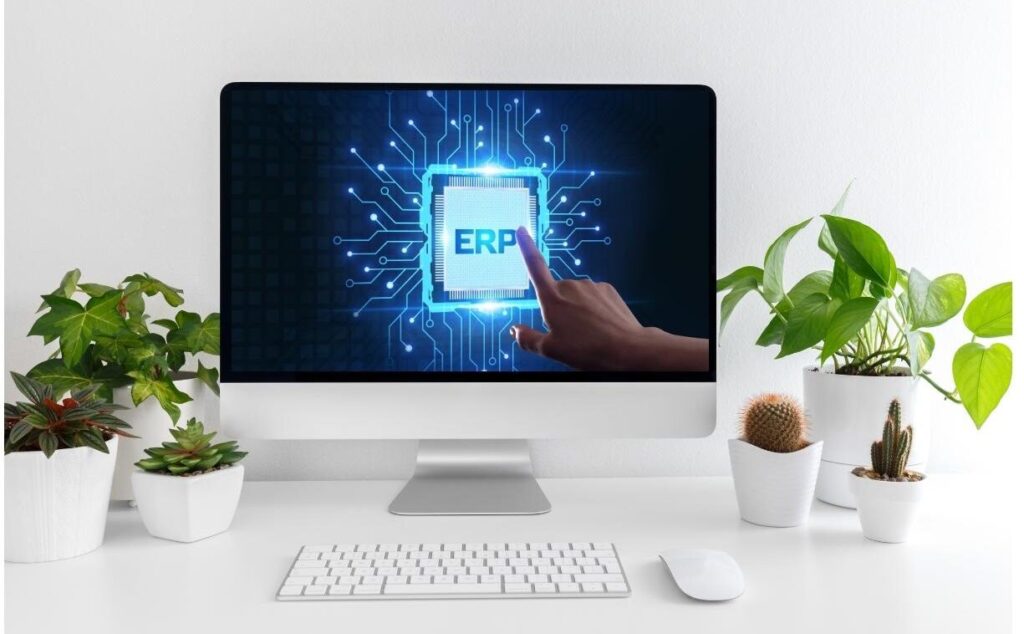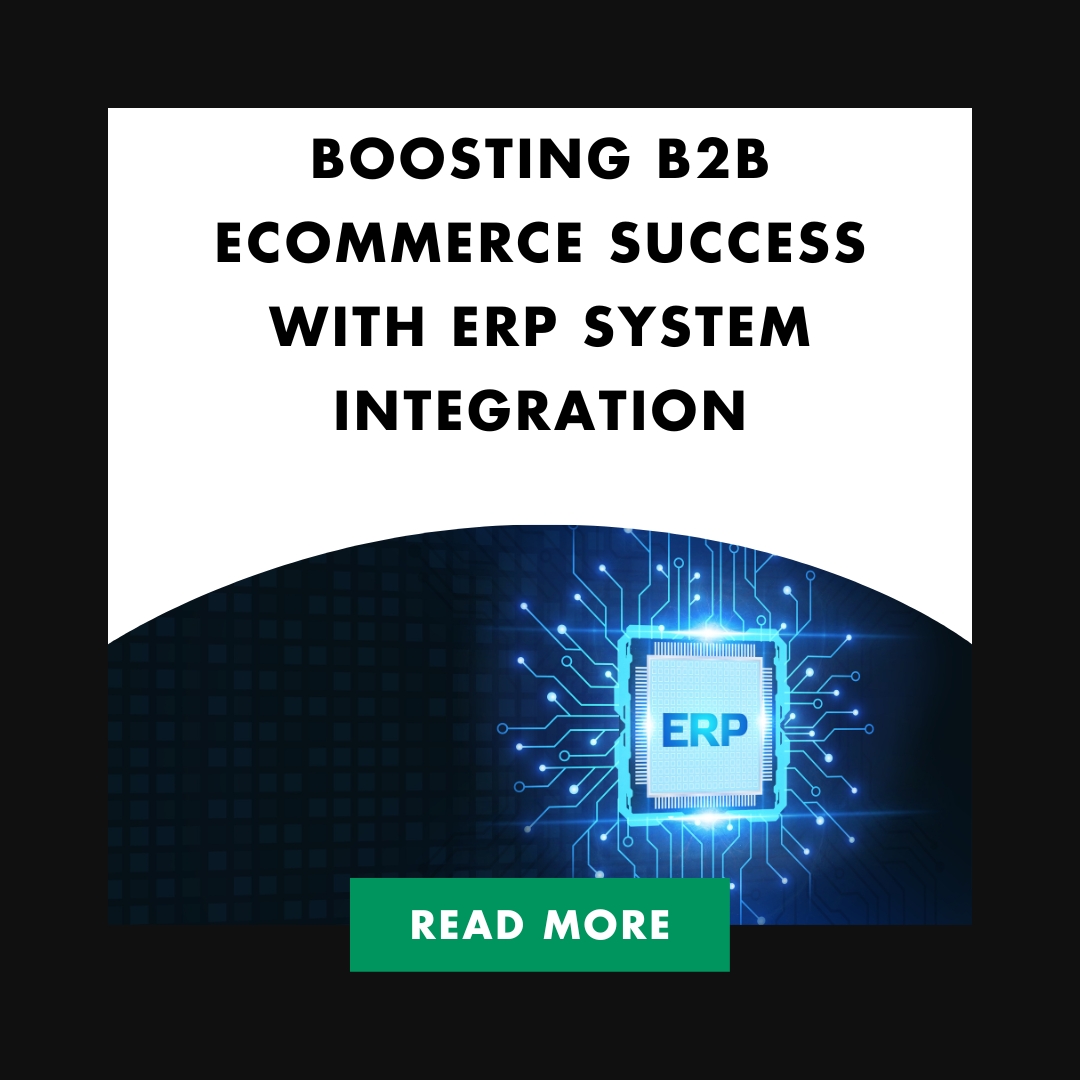Integrating a B2B eCommerce ERP system into your business can have a significant impact. The challenges of handling various departments, inventory, and customer accounts can sometimes become overwhelming. However, with a well-integrated B2B eCommerce ERP system in place, these processes are streamlined efficiently. As a result, you’ll experience improved productivity, enhanced customer satisfaction, and ultimately see an increase in revenue growth.
Table of Contents
Decoding the Role of B2B eCommerce ERP Systems
The essence of a B2B eCommerce ERP system lies in its multifunctional capacity. It’s like the conductor of an orchestra, harmonizing data synchronization, inventory management, order processing, and customer account updates.
A Glimpse into Enterprise Resource Planning (ERP)
Enterprise Resource Planning (ERP) is not just another tech jargon. It’s a game-changer that unifies various business processes across different departments within your organization. Think about it as a symphony conductor who brings together diverse instruments to create beautiful music – or in this case, efficient operations.
An effective ERP system doesn’t just bring these functions under one roof but also offers real-time access to critical business information. This gives you the power to make quick decisions based on accurate insights.
Data synchronization forms the backbone of any robust ERP solution; synchronized data ensures consistency and accuracy throughout all operations – from supply chain logistics through customer service interactions.
Data Synchronization: The Unsung Hero
In today’s digital age where businesses are increasingly relying on their online presence for growth, having accurate up-to-date information available instantly has become more important than ever before. With a well-implemented B2B eCommerce ERP System in place, organizations can ensure they have the right products available at the right time while maintaining optimal stock levels, thereby reducing costs associated with overstocking or under-stocking items.
Making Inventory Management Effortless
If there’s one thing that sets successful enterprises apart from others, it would be how effectively they manage their inventory. An integrated inventory management module within your ERP will help maintain accurate records about product availability, thus improving overall operational efficiency by preventing delays due to out-of-stock situations or oversupply scenarios leading to wasted resources.
Taking Order Processing To The Next Level with Automated Updates
Incorporating automated systems like ERPs simplifies order processing significantly by eliminating manual errors often seen when dealing with large volumes of orders on
Key Takeaway:
Think of a B2B eCommerce ERP system as an orchestra conductor, harmonizing your business operations. From data synchronization to inventory management and order processing, it ensures smooth performance across all departments. It’s not just tech jargon; it’s the unsung hero that helps you hit the right notes in today’s digital age.

Unlocking the Potential of Your B2B eCommerce Store with ERP Integration
Integrating your B2B eCommerce store with an Enterprise Resource Planning (ERP) system can unlock a plethora of possibilities. This goes beyond just streamlining operations; it also improves customer experiences and ensures seamless business processes.
The Power of ERP in B2B eCommerce
An ERP system is no less than a lifeline for businesses aiming to simplify their processes and boost productivity. When you blend this powerful software into your B2B ecommerce platform, you’re essentially bringing together requirements from various departments under one roof, leading to significant cost savings.
This integration makes inventory management a breeze by offering real-time data on stock levels. Not only does it enhance efficiency, but it also takes away the tedious task associated with selling products in large quantities or bulk orders.
The benefits don’t stop at operational improvements though; another major advantage lies in enhancing the customer experience. With accurate product availability information provided by integrated systems, customers are less likely to face out-of-stock issues or unexpected delivery delays – two common hurdles that often sour online shopping experiences.
Data accuracy comes as another strong argument for integration. Automatic synchronization between your ecommerce platform and ERP gets rid of manual data entry errors which could lead to expensive mistakes like overselling or underselling items.
On-Premise vs Cloud-Based ERPs: Making the Right Choice for Your Business
In order to choose an appropriate ERP solution for your business needs, understanding how on-premise and cloud-based ERPs differ becomes essential. Each type has unique features that may be beneficial depending upon specific business requirements.
Differentiating Between Types of ERPs
On-premise software requires a larger upfront investment due to its customizability options, making them best suited towards enterprise-level businesses who have budgets able to accommodate these costs, while cloud-based ERPs typically require lower initial investments, making them attractive options for small to medium-sized enterprises (SMEs).
Finding The Best Fit: Top-Rated Ecommerce-Friendly ERPs
Top-rated ERPs ideal for ecommerce businesses vary based on factors like features
Key Takeaway:
Integrating an ERP system with your B2B eCommerce platform can optimize operations, improve customer experience, and minimize costly mistakes. By combining inventory management, data accuracy, and cost-saving features into one comprehensive solution, an ERP system offers a streamlined approach for businesses. Whether you prefer an on-premise or cloud-based option, selecting the right ERP depends on your unique business requirements.
On-Premise vs Cloud-Based ERPs for B2B eCommerce
The decision between on-premise and cloud-based ERP systems can significantly influence your B2B eCommerce operations. Each option has its own advantages, disadvantages, and characteristics.
The Different Types of ERP
Identifying the varieties of ERPs is an essential initial step in deciding wisely. On one side, you have on-premise software, which involves installing systems locally on your company’s hardware and servers. This type offers high customization to meet specific business needs but tends to be more suitable for larger enterprises due to cost implications.
Cloud-based ERPs, conversely, are internet-operated using third-party hosted software. They offer affordability along with scalability as they eliminate initial infrastructure investment or maintenance costs.
Apart from these two primary categories, hybrid models also exist that blend elements from both platforms providing flexibility based on unique business requirements. Open-source systems present another alternative where users get access to source code enabling them greater control over customization at potentially lower costs.
Best ERP for eCommerce
Finding the perfect ERP solution requires careful evaluation based upon factors like features, costs, and ease-of-use. For instance, NetSuite ERP is often praised for its comprehensive suite including financial management, inventory management, and order processing functionalities. Its real-time visibility into key performance indicators (KPIs) makes it particularly attractive for eCommerce businesses. However, it might not suit all budgets, especially those of small-to-medium-sized enterprises (SMEs).
An alternate could be Odoo, a flexible cloud-based solution offering a modular structure allowing you to pick only what you need. This reduces unnecessary expenditure while ensuring efficiency. The user-friendly UI contributes significantly to the overall satisfaction of users. It’s important, though, to conduct thorough research before making any final decisions considering each system will have varying impacts depending upon individual organizational structures, capabilities, and goals.
Key Takeaway:
Choosing the right ERP for your B2B eCommerce business hinges on understanding the differences between on-premise and cloud-based systems, as well as considering hybrid or open-source options. Consider factors like cost, scalability, features and ease-of-use in your decision-making process.
How to Streamline Workflows with Your Ecommerce Store and Your ERP System
Efficiency in operations is the lifeline of any successful ecommerce store. The secret to achieving this lies within streamlining workflows, and a key player in that process is your ERP system.
The magic of automation brought about by an ERP system cannot be overstated. It’s like having an invisible workforce tirelessly working behind the scenes, ensuring order processing accuracy while freeing up valuable time for other business aspects.
Leveraging Automation Power
Imagine reducing human error rates significantly during order processing or not needing to manually crunch numbers anymore because your trusty ERP system handles it all seamlessly. That’s what we mean when referring to the potential of automation.
This ability doesn’t just stop at improving accuracy; it also creates more room for focusing on growth strategies and customer service enhancements – things that truly matter when you’re running a competitive ecommerce platform.
Navigating Business Process Integration
Moving beyond simple calculations, integrating different business processes effectively becomes crucial if you want to streamline workflows further. When done right, integration allows smooth communication between various teams or departments involved in a project simultaneously.
In essence, changes made by one team can automatically update across relevant areas without manual intervention eliminating potential bottlenecks and inefficiencies along the way.
Drawing Insights from Analytical Data
Beyond efficiency gains through automation and integration, another significant advantage offered by ERP systems comes from their analytical capabilities. These insights enable informed decision-making aimed at optimizing operational efficiency even further.
You could leverage these data points such as inventory levels or sales trends provided by your ERP system analytics, allowing you to adjust marketing strategies accordingly or optimize resource allocation better than ever before.
Now that we’ve looked into how an efficient use of an ERP system can help streamline workflows within your eCommerce ecosystem, let’s shift our focus towards enhancing customer experience specifically within B2B eCommerce.
Key Takeaway:
Harness the magic of an ERP system to streamline your ecommerce store’s operations. With its automation power, it reduces human errors and frees up time for growth strategies. Integrated business processes eliminate bottlenecks while analytical capabilities provide valuable insights for informed decision-making.
ERP Integration: A Game-Changer in the B2B Ecommerce Landscape
The combination of an Enterprise Resource Planning (ERP) system and a B2B eCommerce platform is truly revolutionary. The focus is on improving the customer experience, providing personalized services, increasing efficiency in order fulfillment, and delivering timely updates on customer accounts.
A Personal Touch for Enhanced Customer Experience
An integrated ERP solution allows businesses to understand their clients better. By analyzing comprehensive data from the ERP software, companies can offer targeted marketing campaigns or product recommendations that align perfectly with their clients’ preferences.
This level of customization not only helps to increase engagement but also promotes strong ties between businesses and their customers. In essence, it contributes to an enhanced customer experience which ultimately drives brand loyalty and repeat purchases.
Streamlining Order Fulfillment Process
Efficient order fulfillment is crucial for maintaining high customer satisfaction in any ecommerce business. An integrated ERP solution plays a key role in achieving this efficiency by automating tasks like inventory management, order processing, and shipment tracking. Having real-time visibility into inventory levels ensures that there is enough stock available, minimizing backorders or delays that can harm the selling process. By tracking all orders from placement to delivery, accurate information is provided at every stage, enhancing transparency and building trust between the company and its customers.
Prompt Updates – The Key To Customer Satisfaction
In today’s digital world, consumers expect quick access to information regarding transactions. Integrating your ecommerce platform with an ERP system ensures timely updates on customer account statuses.
Conclusion
Understanding the role of a B2B eCommerce ERP system is vital for any enterprise.
This powerful tool streamlines operations, from data synchronization to inventory management.
The integration of your B2B eCommerce store with an ERP system can lead to enhanced efficiency and customer experience.
Comparing on-premise and cloud-based ERPs, each with its own advantages and disadvantages, is key to streamlining operations between your ecommerce store and your ERP system.
We also touched on how you can streamline workflows between your ecommerce store and your ERP system for seamless operations.
And let’s not forget the impact it has on enhancing customer experience in the B2B ecommerce ecosystem through effective integration.
If you feel overwhelmed or don’t know where to start, fear not! Forest City Digital is here to help.We are experts in providing top-notch SEO, Google Ads, and email marketing solutions that will propel your business to new levels of success. Additionally, we offer a customized ERP System designed to optimize your operations and meet your unique requirements. Start improving your operational efficiency today by visiting Forest City Digital.
